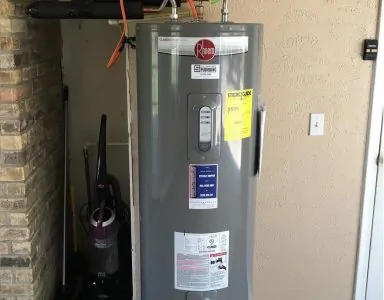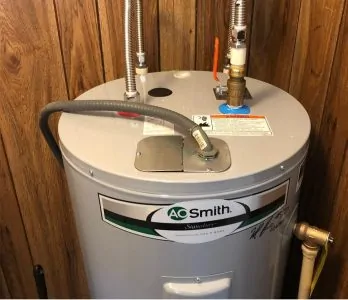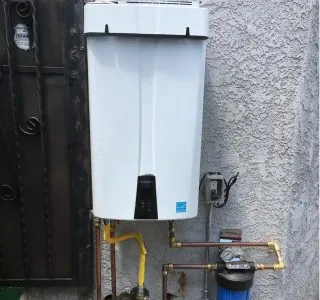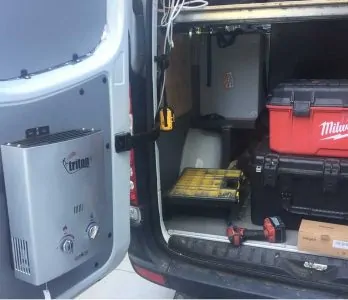The weight of a hot water heater isn’t important… until you have to move it yourself. If you’re buying a new one and doing a DIY install, it’s good to know what to expect.
So, just how much does a water heater weigh? Learn all about water heater weight, capacity, and how to move it in the article below.
Key Takeaways
- Water heater weight depends on tank capacity and type (tank or tankless).
- Empty tank water heaters weigh between 120-150 pounds, while tankless heaters weigh 30-50 pounds.
- To calculate the weight of water inside the tank, multiply the tank’s volume by the water’s density (997kg per cubic meter).
- When moving a water heater, empty it first and ask for help or use a cart to transport it.
How Much Does a Water Heater Weigh?
Before giving you any actual numbers for these boilers, it’s important to mention that the size and capacity of the water heater will greatly influence the end size. You can’t expect a 40-gallon heater to have the same weight as an 80-gallon one.
- Empty Water Tank Heater: 120-150 pounds.
- Full Water Tank Heater: About 600-650 pounds.
- Empty Tankless Heater: 30-50 pounds.
- Full Tankless Heater: 80-100 pounds.
How to Calculate the Weight of Water in a Tank
The mass of the water is calculated based on water density (about 997kg per cubic meter) and the volume of the tank. If you know how many gallons of water your tank holds (its volume), you can simply multiply the volume and density to get the mass.
If you don’t know the capacity of your water tank, you will need to determine its height and radius to calculate the volume. The easiest way to do this is to use an online calculator.
Average Water Heater Weight
The average water heater weight fluctuates based on the model, the construction, and the size of the tank. Note that these factors will also influence the cost of a water heater, not just its weight.
Tank vs. Tankless vs. Commercial
Water heaters are usually divided into tank, tankless, and commercial categories.
Tank water heaters have a reservoir that stores a certain water capacity and heats it. Depending on the heater’s capacity, a tank heater can range between 100 and 150 pounds in weight.
Tankless models heat water on demand. Rather than storing water inside a tank, they heat the water as you turn on the corresponding faucet.
Because they don’t have a tank, they are lighter in weight compared to tank models. They usually weigh between 10 and 85 pounds.
Commercial water heaters are usually found in larger buildings and facilities, such as office buildings, commercial centers, or hotels. These water heaters are very heavy and can weigh up to 750 pounds.
Size of Storage Tank
As mentioned earlier, the weight of a tank water heater depends on the size of the storage tank, also known as the tank capacity. The bigger the storage tank is, the more water it holds and the heavier it is. To give you an idea:
- A 30-gallon heater is great for a house with one or two people and can weigh a little under 100 pounds.
- A 40-gallon water heater usually weighs around 140 pounds.
- Heaters that have a 50-gallon capacity might weigh around 160 pounds on average.
- The average water heater weight for a 60-gallon heater is between 200 and 250 pounds.
- Water heaters with 75-gallon tanks could weigh around 300 pounds.
- 100-gallon water heaters are amongst the heaviest on the market and can weigh between 300 and 400 pounds while empty.
Water Heater Materials
Needless to say, the construction of the water heater will also contribute to its weight. For example, a water heater made from stainless steel will be heavier than one made from galvanized steel. Cast iron heaters are the heaviest.
Examples of Water Heater Weight
The weight of the water heater depends on the factors mentioned earlier. However, if you want some specific examples, I’ve put together a table to show you the weight of certain tanks, specifying both the empty and full weight of the heater.
| Water Heater Model | Tank Capacity | Weight of Empty Heater | Weight of Full Heater |
| Rheem #XE40M06ST45U1 | 40 Gallons | 106 pounds | 440 pounds |
| Westinghouse #WER052C2X045N | 52 Gallons | 118 pounds | 552 pounds |
| Westinghouse #WGR060NG076 | 60 gallons | 170 pounds | 670 pounds |
| A.O. Smith Signature Premier | 80 gallons | 302 pounds | 969 pounds |
| Westinghouse #WEC115C2X055 | 115 gallons | 224 pounds | 1183 pounds |
Tips For Moving a Water Heater
Moving a water heater is not something people usually do, but there are situations where you might have to do it. If you’re moving to a new place, performing some wall repairs, renovating, or installing a new water heater, consider the following tips:
- Always empty the heater before removing it from its original location.
- If possible, take out any removable pieces that add to the overall weight of the tank.
- Ask for help because moving a heavy water heater by yourself is never really an option.
- Use something to help you carry the heater, like a wheelbarrow or a cart.
- If you turn to the above method, secure the water heater to ensure it doesn’t fall during transportation.
- If you’re moving the heater across your own property, make sure the way is clear by removing obstacles.
Should You Hire a Professional?
When it comes to DIY projects for homeowners, relocating your water heater is one of the more difficult ones you can take on.
In many cases, transferring your water heater is an exceedingly delicate task that can go wrong. This is due to issues like plumbing setups, building codes, and the type of heater in question.
The actual moving of the water heater isn’t the most complicated part. That would be disconnecting, removing, and installing the heater in its new location. That’s what you might need to hire a professional for.
You need an expert if you have no experience with plumbing, if your new heater requires making any electric wiring modification or if you need to fiddle with the gas pipes.
Safety Precaution
Don’t attempt to move the tank yourself if you have back issues or can’t comfortably lift more than 50 pounds.
Final Words
So, how heavy is a water heater? I hope this article answers the question. Whether you’re getting rid of an old one or bringing a new one inside, it’s good to know. Never try and lift or move too much weight on your own.






